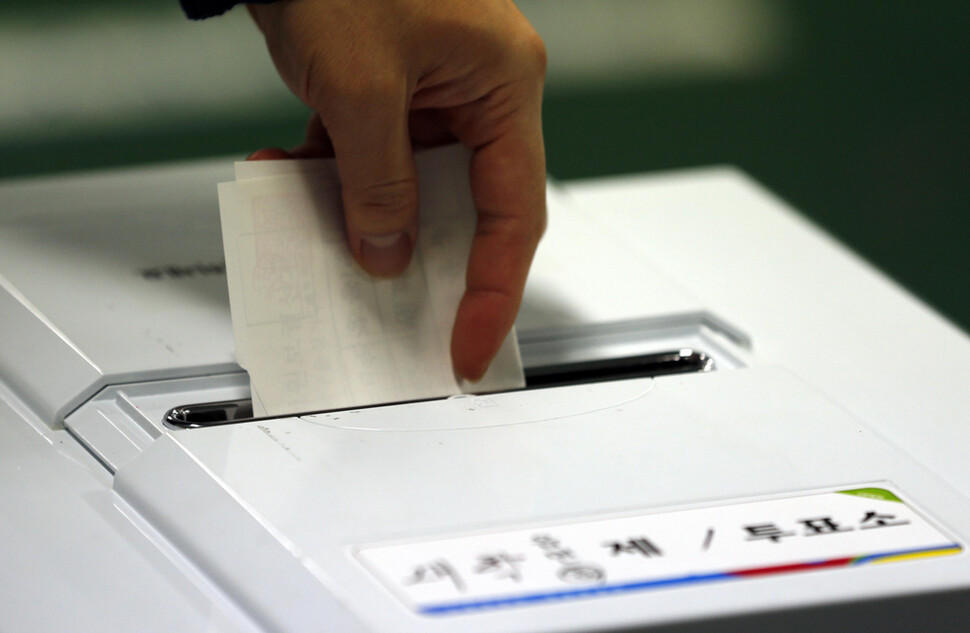Hankyoreh New Year’s Poll
“Opposition victory” 49.5%-“Righting party victory” 36.7%
A year ago, more than half “voted in the ruling party”
The public sentiment that the ruling party supported, 15% turned around
By Lee Jong-geun, staff reporter [email protected]
The nationwide public sentiment, which was about three months ahead of the re-election by default, was inclined to the’regime judgment theory’. People’s sentiment in Seoul, Busan, Ulsan, and Gyeongnam, where the by-election of regional group heads is held, also showed a relatively high preference for the victory of the opposition party. This is the same trend as the approval ratings of the president and ruling party, which soared on the back of favorable reviews for the coronavirus quarantine, declined along with the conflict between the Ministry of Justice and the prosecution. A survey conducted for three days from December 27 to 1,000 voters over the age of 18, commissioned by a public opinion polling agency Casestat Research (at 95% confidence level, ±3.1% point of sample error). In the re-election), the response that the opposition candidate must win’ (49.5%) surpassed the response that the ruling party candidate must win in order to complete the reform (36.7%) by 12.8 percentage points. Responses that’the opposition candidate should win’ were high in their 60s (60.3%), 70s or older (65.5%), Daegu and Gyeongbuk (61.3%), and conservatives (74.1%), and’the ruling party candidate should win’ The respondents showed clear dominance in Honam (64.2%) and advanced class (64.9%).

In Seoul, Busan, Ulsan, and Gyeongnam regions where mayoral elections are held, 56.1% and 50.0% of the respondents said that the opposition party must win, respectively, exceeding half of them. Only 31.6% of respondents said’the ruling party should win’ and 38.2% of Boo, Ul, and Gyeong. This contrasts sharply with 51.7% of the 2020 New Year’s poll, which was held after three months of the 21st general election, that’we must vote in the ruling party for the liquidation of redemption and uninterrupted reform’. At that time, 37.9% of respondents said,’To correct the Moon Jae-in administration’s soloism and the situation, we must vote for the opposition party’. Election public sentiment has changed to a similar figure within a year. Noteworthy is that 52.6% of the middle class and 24.4% of the progressives answered that’the opposition candidate should win’. The majority of the electorate who supported the Democratic Party’s overwhelming victory in the general elections has fled. In fact, 23.4% of respondents who voted for the Democratic Party candidate in the April general election were on the side of’Opposition Victory’. The voters replied that they would prioritize’capacity’ in the selection of candidates rather than’parties’. When asked about the criteria for selecting candidates, 61.8% of the respondents answered’candidate who can work hard for regional development’,’candidate who can correct the mistakes of the former mayor’ (24.3%), and’helping the supporting party win the presidential election. It is far ahead of the’candidate’ (11.5%). The perception that it is an election that elects a group leader rather than a member of the National Assembly seems to have influenced the answer. Both Seoul (59.8%) and Boo, Ul, and Gyeong (68.2%) were generously ahead of the voices demanding’regional development’. Regarding President Moon Jae-in’s state administration, the negative evaluation was 56.8% (very wrong 32.5%, wrong 24.3%), far ahead of the positive evaluation (39.4%. Very good 12.2%, good 27.2%). As for the political party leadership, 31.0% of the Democratic Party and 28.0% of the people’s strength were. The rest were the Justice Party (7.4%), the National Assembly Party (5.8%), and the Open Democratic Party (4.3%). 18.9% of respondents said there was no party to support. By Kim Mina, staff reporter [email protected]
■ How did you investigate
Date of investigation December 27-29, 2020
Target of investigation 1000 men and women aged 18 and over nationwide
Survey method Telephone interview survey using mobile phone virtual number
Response rate 24.4%
Sampling Weighted value is given after sampling according to the proportion of the population by region, sex, and age (based on resident registration population announced by the Ministry of Public Administration and Security in November 2020)
Sample error ±3.1% points at 95% confidence level
Investigation agency Casestat Research Co., Ltd.
Investigation request Hankyoreh Newspaper
